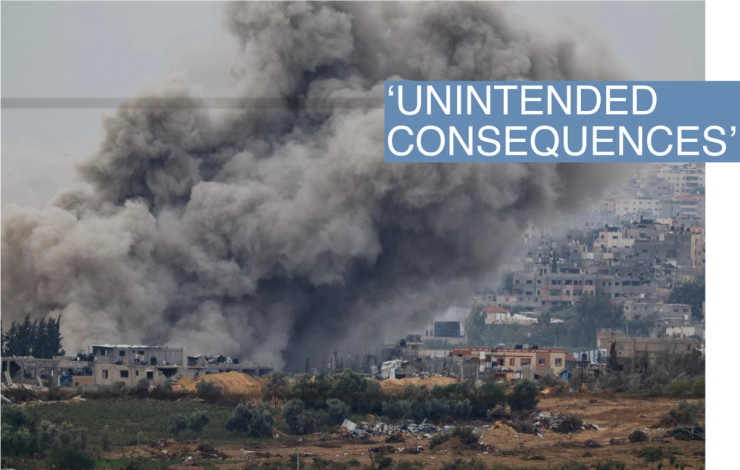The News
Attacks by Yemen’s Iran-backed Houthi rebels on Israeli ships in the Red Sea have sparked fears that the Israel-Hamas war could still spiral across the Middle East even as the two sides agreed on a pause in the fighting.
The U.S. is reportedly considering designating the Houthis as a terrorist organization following the attacks: Analysts say the Houthis raid mirrors Iranian military tactics, prompting fears of an escalation in the frequency of such strikes.
So far, however, Gulf nations have voiced their desire to avoid the conflict metastasizing further. Iran told the U.S. last week that it wanted to avoid a broader conflict — but it did not rule out the possibility if Israel’s bombardment of civilians continues.
SIGNALS
The White House National Security Council has said there are signs of collaboration between Russia and Iran against Israel. The Wagner Group — a paramilitary arm of the Kremlin — is preparing to provide air defense capabilities to Iran and Lebanon’s militant Hezbollah group, NSC spokesperson John Kirby said Tuesday. Ties between Israel and Russia are at their lowest point in years, journalist Milàn Czerny wrote for the Carnegie Endowment for International Peace. The “abrupt cooling” in ties “could quickly have unintended consequences,” he says. “Israel has already stopped giving advance warning to Moscow ahead of airstrikes it carries out in Syria, raising the risk of an inadvertent confrontation between the two powers.”
Leaders in the Middle East are closely watching the moves of Hassan Nasrallah, Hezbollah’s leader. The militant group has an extensive arsenal which rivals that of some countries, Joe Buccino, a retired U.S. Army colonel, wrote in Al Arabiya. How Nasrallah behaves in the coming weeks and months could determine whether the conflict spirals further. “While neither side wants an all-out war, a strategic miscalculation could lead to escalation,” Buccino noted.
The war has yet to expand beyond Israel and the Gaza Strip, and neighboring nations have so far exercised restraint. Any missteps, though, risk broadening the conflict, Veena Ali-Khan, a Yemen and Persian Gulf researcher, wrote for Al-Monitor. Gulf nations recognize the anger in their populations towards Israel’s treatment of Palestinian people, Ali-Khan said, and while “Gulf States now condemn Israel ... for the past six years they have overlooked the Palestinian issue and pursued deals with Israel.” That the war has not yet spilled over could be influencing Gulf nations’ decision-making: They “now calculate that escalation may no longer be imminent, shaping their policies of non-intervention,” Ali-Khan noted.



